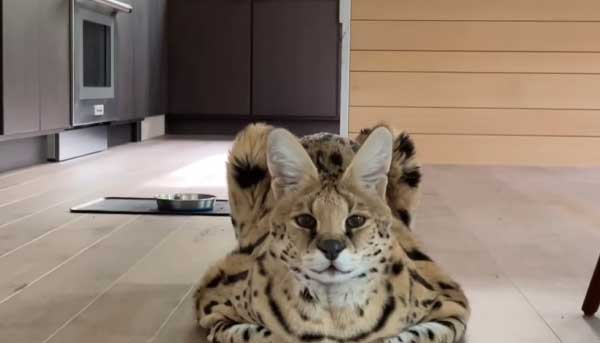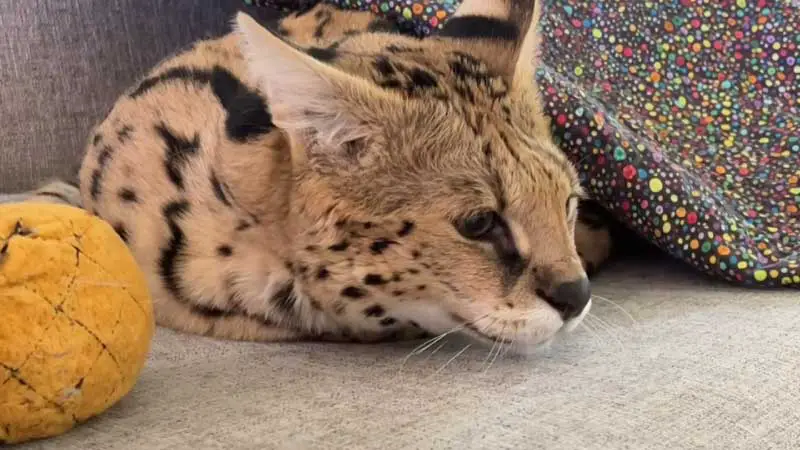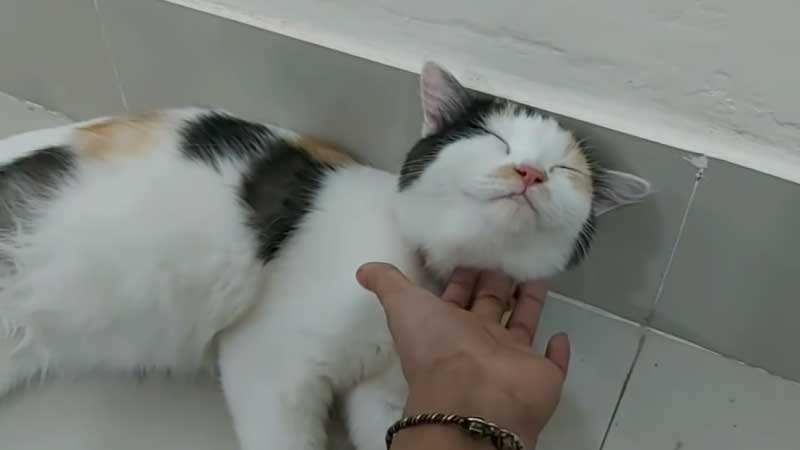Ever stared at the stunning spots of a serval cat and thought, “How cool would it be to have one of those prowling around my California home?” Well, you’re not alone! But here’s the quick scoop: Are serval cats legal in California?
The short answer is, nope, it is illegal to own a serval in California.
But why? Is it about safety, conservation, or something else? Stick around as we dive deep into the fascinating world of these wild felines and California’s rules about them. There’s so much more to the story than a simple yes or no!
Table of Contents
Are Serval Cats Legal in California? An Overview

California, known for its sun-kissed beaches, Hollywood glitz, and expansive national parks, also has a reputation for strict wildlife and pet ownership regulations. When it comes to the exotic and mesmerizing serval cats, many residents and enthusiasts are left pondering: Can you legally own one in the Golden State?
The short answer is: No, owning a serval cat in California is not legal. The state classifies servals and other exotic animals as restricted species under the California Code of Regulations (CCR) Title 14, Section 671.
This classification means that servals are considered potentially harmful to native wildlife, the environment, or the public.
Why so strict? There are a few reasons.
- First, there’s a potential threat to local ecosystems. Should a serval escape or be released into the wild, it could become an invasive species, preying on native animals and upsetting the ecological balance.
- Secondly, there’s the human safety factor. Even though serval cats can be affectionate, they’re still wild animals with unpredictable behaviors that might pose risks to their owners or neighbors.
- Lastly, there’s the ethical argument about whether it’s right to keep wild animals as pets, potentially subjecting them to environments they’re not naturally adapted to.
However, while owning a serval as a pet is off the table in California, the state does permit them for other purposes under specific conditions, such as research, education, and certain entertainment purposes, but a special permit is required.
You may also like: Cats with Mustaches
Serval Cats vs Domesticated Cats: A Short Comparison

At first glance, one might mistake a serval cat for an unusually large housecat with attractive markings. But under the surface, the differences between servals and our familiar domesticated felines run deep. Let’s dive into a side-by-side comparison.
| Keys | Serval Cats | Domesticated Cats |
|---|---|---|
| Appearance | Standing tall with elongated legs, servals boast a slender body covered in bold, contrasting spots. Their large, rounded ears are set close together, giving them an almost alien appearance. Adult servals can weigh between 20 to 40 pounds. | Household cats come in a variety of shapes, sizes, and colors, but they typically weigh between 5 to 20 pounds. Their physical traits can vary widely, but none match the distinct look of a serval. |
| Behavior | These are wild animals, and it shows in their behavior. They’re highly active, especially at dawn and dusk. Their hunting instincts are sharp, making them efficient predators. | While they still retain some hunting behaviors, domestic cats have been bred for companionship over millennia, making them more adaptable to living in human homes. |
| Habitat | Native to Africa, servals thrive in wetlands, grasslands, and savannas. They require ample space to roam and hunt. | These felines have adapted to various living conditions, from large farmhouses to compact city apartments. |
| Diet | In the wild, servals primarily feed on rodents, birds, frogs, and even fish. In captivity, their diet must be carefully managed to mimic their natural intake, often requiring raw meat preparations. | Commercial cat food, available in wet or dry form, suffices for most domestic cats, though some owners do opt for specialized diets. |
| Social Needs | As solitary creatures, servals are territorial and may not take kindly to intruders or other animals. | While some cats prefer solitude, many enjoy the company of humans and other pets. Their social behavior varies widely. |
| Lifespan | In the wild, servals live for about 10-12 years, but in captivity, they can live up to 20 years with proper care. | The average lifespan of a domestic cat ranges from 12-15 years, with many reaching their late teens or even early twenties. |
Frequently Asked Questions (FAQs)
Are there any permits available for keeping servals in California?
Yes, while the general public cannot own serval cats as pets in California, there are specific permits available for research facilities, educational programs, and certain entertainment purposes. These permits come with stringent conditions and ensure the serval’s treatment aligns with state guidelines.
How are violations reported and dealt with?
Violations related to the ownership of restricted animals like servals can be reported to the California Department of Fish and Wildlife or local animal control agencies. Penalties for violations can range from hefty fines to potential jail time, depending on the severity of the offense and whether it’s a repeated violation.
What are the primary reasons behind the ban (if they are banned)?
Serval cats are banned as household pets in California primarily due to ecological concerns (potential to become invasive species), public safety risks (unpredictable wild behaviors), and ethical considerations (keeping wild animals in domestic environments).
Can serval hybrids, like the Savannah cat, be legally owned in California?
The legality of owning serval hybrids like the Savannah cats in California varies depending on the generation of the cat. While purebred serval cats are prohibited, specific generations of hybrids might be allowed. However, it’s essential to check state and local regulations before acquiring one.
Are there rescue centers or sanctuaries for serval cats in California?
The short answer is yes. There are several wildlife rescue centers and sanctuaries in California that cater to exotic and wild animals, including servals. These facilities are dedicated to providing care, rehabilitation, and, when possible, rehoming or reintroducing animals to appropriate environments.
Final Verdict
If you’re considering adding a touch of the wild to your home with serval cats in California, think twice. The state’s laws make it clear: owning a serval as a household pet isn’t on the cards for most residents. These regulations stem from valid ecological, safety, and ethical reasons.
However, the allure of the wild isn’t entirely out of reach. There are serval hybrids, like the Savannah cat, that might offer a middle ground, though they come with their own sets of rules.
For those genuinely passionate about these magnificent creatures, consider supporting or visiting local rescue centers or sanctuaries. Here, you can witness their beauty and grace without compromising their well-being or breaking the law.




